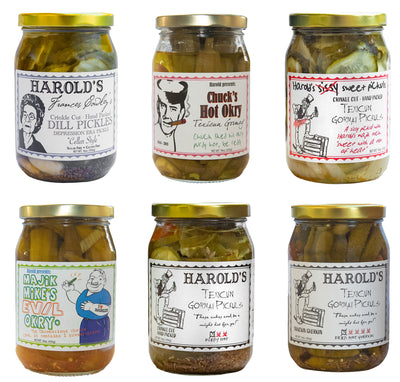Are Pickles Vegetarian Food?
Pickles are crisp and tangy delights. They have decorated plates and added flavor to countless dishes across the culinary spectrum. However, a common question arises within the world of dietary choices: Are pickles vegetarian food? It's a query that may seem simple at first glance but unravels into a brief exploration of ingredients and processes.
What Are Pickles?
Pickles are a culinary marvel that has been cherished for centuries, adding a burst of flavor and zest to meals across the globe. At their essence, pickles are vegetables, primarily cucumbers, that have undergone a transformative preservation process. This preservation typically involves immersing the vegetables in a brine or vinegar solution, often infused with spices and seasonings. As the vegetables soak in this flavorful concoction, they undergo a magical metamorphosis, emerging as crisp, tangy, and savory delights that tantalize the taste buds. Pickles come in various forms, from classic dill Pickles to sweet and spicy varieties, reflecting the diverse culinary traditions that have embraced their unique and delightful taste.
Is a Pickle a Fruit Or Vegetable?
The age-old debate surrounding whether a pickle is a fruit or vegetable often sparks curiosity and confusion. To settle this culinary problem, it's essential first to understand the pickle's origin. Pickle are, in fact, vegetables, most commonly cucumbers, that have undergone a preservation process. Whether soaked in a brine solution or vinegar, pickles retain their vegetable identity while absorbing the distinct flavors of the preserving liquid. While cucumbers may technically be classified as fruits due to their seed-bearing structure, once they transform into pickles through pickling, they unmistakably fall into the vegetable category, making them a savory and tangy addition to culinary creations.

Vegetarianism and Pickles
Vegetarianism and pickles share a harmonious relationship, with pickles being a welcome addition to the dietary repertoire of many vegetarians. These tangy, salty treats are inherently vegetarian, consisting of vegetables preserved in vinegar or brine infused with delightful spices. The simplicity of their ingredients and the absence of animal-derived components make pickles a go-to snack or condiment for vegetarians seeking flavorful options that align with their dietary choices. Whether enjoyed atop a burger, as a side dish, or straight from the jar, pickles offer taste and nutrition, enhancing the vegetarian culinary experience.
Are pickles Vegetarian food?
Pickles, those crisp and tangy delights, have adorned plates and added flavor to countless dishes across the culinary spectrum. However, a common question arises within the world of dietary choices: Are pickles vegetarian food? It's a query that may seem simple at first glance but unravels into a nuanced exploration of ingredients and processes. This article delves into pickles, dissects their components, and demystifies whether they align with vegetarian dietary preferences. So, let's peel back the layers of hot pickle to uncover the answer to this intriguing culinary question.
Vegetarian-Friendly Pickles
Vegetarian-friendly pickles are a flavorful and versatile addition to vegetarian diets, offering a tangy and savory punch that complements various dishes. These pickles, crafted from vegetables preserved in a brine or vinegar solution, align perfectly with vegetarian dietary choices as they contain no animal-derived ingredients in their core composition. However, it's essential to exercise caution with specialty or flavored pickle varieties, as certain additives or flavorings may incorporate non-vegetarian elements. Nonetheless, classic pickles like dill or bread and butter pickles are typically safe bets for vegetarians, making them a delightful and crunchy condiment or snack to relish.

DIY Pickling: Ensuring Vegetarian and Vegan Choices
Creating your pickled delights is a rewarding culinary adventure that allows you to ensure your pickles align with vegetarian and vegan dietary choices. When you embark on the journey of DIY pickling, you have full control over the ingredients that go into your brine, guaranteeing that no animal-derived components find their way into your jars. This level of customization empowers you to craft pickles that are not only delicious but also fully compliant with your dietary preferences, whether you're a dedicated vegetarian, a strict vegan, or simply someone who relishes the art of homemade pickling.
Cultural and Regional Variations of Pickles
Cultural and regional variations of pickles are a testament to the diverse and dynamic nature of culinary traditions worldwide. From Korea's fiery and intense kimchi to the sweet and sour bread-and-butter pickles of the United States, every culture has put its unique spin on pickling. These variations reflect local tastes and preferences and highlight the creative ways communities have preserved and enhanced the flavors of their favorite vegetables. Whether it's the Indian achar, Japanese tsukemono, or the European gherkin, pickles serve as flavorful ambassadors of cultural heritage, connecting people through the universal language of food.
Are pickles naturally made?
Pickles can be naturally crafted through a centuries-old preservation technique known as fermentation. This traditional method unfolds naturally when vegetables are submerged in a brine or vinegar solution and allowed to ferment gradually. Within this transformative process, beneficial bacteria, particularly lactobacillus, flourish and work their magic by converting the inherent sugars in the vegetables into lactic acid. This alchemy effectively preserves the vegetables and bequeaths that distinctive tangy zest to the pickles. Their self-sufficiency sets naturally fermented pickles apart; they require no additional vinegar or synthetic preservatives. Naturally fermented pickles represent an authentic and flavorful choice for pickle lovers who appreciate a more wholesome and time-honored approach to pickling.
Are Pickles Healthy?
Pickles can make a nutritious addition to your diet when enjoyed in moderation. These cucumbers, pickled to perfection, are low in calories and completely devoid of fat, making them a guilt-free snack option. Furthermore, pickles provide a source of dietary fiber, which is pivotal in aiding digestion and promoting a sense of satiety that lasts. Nevertheless, it's crucial to be mindful of their elevated sodium levels, as excessive salt intake has the potential to contribute to elevated blood pressure and various other health concerns. To address this concern, opting for pickle varieties with reduced sodium content or consuming them in smaller portions can help mitigate these health risks. In summary, while pickles offer certain nutritional advantages, incorporating them into a well-rounded diet is the smart approach to appreciate their positive attributes fully.
Health Benefits of Pickles
In their briny and tangy glory, pickles offer more than just a burst of flavor; they can also contribute to your overall well-being. This low-calorie, fat-free treats are rich in dietary fiber, making them a wholesome addition to your diet. Beyond that, the fermentation process involved in pickling introduces beneficial probiotics to your gut, aiding digestive are pickles healthy. However, it's essential to exercise moderation when enjoying pickles, given their high sodium content. Keeping them as a flavorful condiment or side dish within the context of a balanced diet ensures you savor the health benefits without overindulging in sodium.

Nutritional Value of Pickles
Often celebrated for their bold and tangy flavors, pickles offer more than a palate-pleasing punch. They also bring a surprising array of nutritional benefits to the table. These crunchy, preserved vegetables are low in calories, making them a guilt-free addition to meals. Pickles are also a dietary fiber source, aiding digestion and promoting a feeling of fullness. Additionally, the pickling process introduces probiotics, which can support gut health. However, it's important to be mindful of their high sodium content, and individuals watching their sodium intake should consume pickles in moderation. Despite this caveat, pickles can be a delightful and nutritious complement to a balanced diet, adding flavor and healthful elements to your culinary repertoire.
Can Vegans Eat Hot and Spicy Pickles?
Vegans can indeed enjoy Hot and spicy pickles with enthusiasm. Hot and spicy pickles, just like their milder counterparts, are generally vegan-friendly. Cucumbers (or other vegetables), vinegar or brine, spices, and plant-based salt are the primary ingredients in making these fiery delights. However, vegans must exercise caution when purchasing commercial hot and spicy pickles, as some specialty varieties might include additives or flavorings that could contain non-vegan elements. Nonetheless, most classic hot and spicy pickle varieties are a tasty and safe addition to a vegan diet, offering that satisfying combination of heat and crunch that appeals to many taste buds.
Conclusion
Pickles occupy a harmonious and delectable spot in the grand tapestry of vegetarian and vegan diets. They are, by nature, vegetarian-friendly, and the majority of pickle varieties you encounter will align with vegetarian and vegan dietary principles. However, as with any food product, it's wise to read ingredient labels, especially for specialty or flavored pickles, to ensure they meet your dietary preferences. Pickles stand as a testament to the harmony between nature's bounty and the art of preservation. They proudly bear the vegetarian-friendly label, with their core ingredients of vegetables, vinegar or brine, salt, and spices remaining wholly plant-based. While occasional exceptions may arise in specialty or flavored pickle varieties, the vast majority of pickles available on the market align seamlessly with vegetarian and vegan dietary principles. So, whether you're a dedicated vegetarian, a devoted vegan, or simply a fan of bold, tangy flavors, you can confidently enjoy pickles, knowing they are a savory addition to your meat-free journey through the culinary world.


